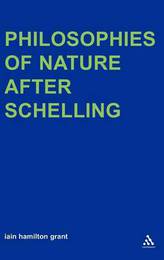
|
Philosophies of Nature after Schelling
Hardback
Main Details
| Title |
Philosophies of Nature after Schelling
|
| Authors and Contributors |
By (author) Iain Hamilton Grant
|
| Series | Transversals: New Directions in Philosophy |
|---|
| Physical Properties |
| Format:Hardback | | Pages:246 | | Dimensions(mm): Height 234,Width 156 |
|
| Category/Genre | Philosophy |
|---|
| ISBN/Barcode |
9780826479020
|
| Classifications | Dewey:113 |
|---|
| Audience | | Postgraduate, Research & Scholarly | |
|---|
|
Publishing Details |
| Publisher |
Bloomsbury Publishing PLC
|
| Imprint |
Continuum International Publishing Group Ltd.
|
| Publication Date |
18 June 2006 |
| Publication Country |
United Kingdom
|
Description
In 1799, F.W.J. Schelling claimed that 'To philosophize about nature is to produce it'. Two centuries later Gilles Deleuze called for a philosophy of nature - Deleuze did so at a time when concerns with and concepts of artificial life and intelligence were already developing rapidly. How would such a philosophy of nature differ from our extant philosophies and sciences of nature? Working against current representationalist analyses of nature, On an Artificial Earth constructs a contemporary philosophy of nature such as Deleuze was working on before his death, based on its most extravagant exponent, F.W.J. Schelling. As well as providing a lucid account of the major works in the philosophy of nature by Schelling and those of his scientific contemporaries who pursued and furthered that project, the book reconstructs Schelling's speculative physics in order to examine the most widely contested of today's scientific and cultural problems, from intelligence and material architecture to artificial life, technological evolution and genomics.
Author Biography
Iain Hamilton Grant is Senior Lecturer in Philosophy at the University of the West of England. He has written widely on post-Kantian European philosophy and is translator of Lyotard's Libidinal Economy and Baudrillard's Symbolic Exchange and Death.
Reviews"Philosophies of Nature after Schelling is an important, indeed a groundbreaking work." - Joseph P. Lawrence, College of the Holy Cross, Notre Dame Philosophy Review, May 10, 2007 "Iain Hamilton Grant's book Philosophies of Nature after Schelling proposes that we think about nature as irreducible to the entire dichotomous game of self and world, idealism and realism. Indeed, Grant argues for a reconsideration of "nature" in terms of the classical notion of phusis-this is a 'physics' that is less concerned with quasi-verifiable, smallest units of matter and more a physics in the sense of a dynamical and ideational flux that pervades the very correlation of self and world, idea and thing." -Eugene Thacker, Leonardo/ISAST, 2009 "Iain Hamilton Grant's book Philosophies of Nature after Schelling proposes that we think about nature as irreducible to the entire dichotomous game of self and world, idealism and realism. Indeed, Grant argues for a reconsideration of "nature" in terms of the classical notion of phusis-this is a 'physics' that is less concerned with quasi-verifiable, smallest units of matter and more a physics in the sense of a dynamical and ideational flux that pervades the very correlation of self and world, idea and thing." -Eugene Thacker, Leonardo/ISAST, 2009 "Intriguing and ambitious ... Philosophies of Nature After Schelling sets a new standard for Schelling scholarship. More than this, it is an important work of philosophy in its own right." - Radical Philosophy 144 (July/August 2007) * Radical Philosophy *
|